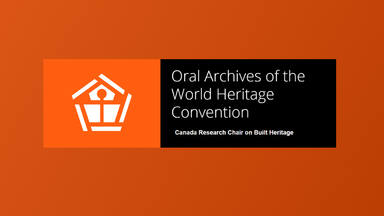
Interview
Adrian Phillips
World Heritage Convention
Adrian Phillips has a background in Geography (University of Oxford) and Urbanism (University College London).
He has had an active career in environmental conservation both at home and abroad. In the United Kingdom he was Director of the Countryside Commission from 1981 to 1992. Before that he worked for UNEP and was IUCN Programme Director. He has been a member of the World Commission on Protected Areas of IUCN since 1981 and was elected Chairman from 1994 to 2000, then Vice-Chair for World Heritage 2000 to 2004. During this period, he was also a professor at the University of Cardiff. In 1998, he was awarded the Commander of the Most Excellent Order of the British Empire (CBE) for his services to the environment. He is a Member of the Royal Town Planning Institute and a Fellow of the Landscape Institute.
As a geographer, Adrian Phillips has not limited himself to natural heritage issues but has also been interested in cultural landscapes. He has written numerous articles in this regard, such as "Why Lived-In Landscapes Matter to Nature Conservation" (APT Bulletin, vol.34, no1, 2003, p.5-10). He was series editor for fourteen issues of IUCN's "Best Practice Guidelines for Protected Areas" series, and authored the volume on protected (or lived-in) landscapes. Since 2005, his work with the National Trust has provided him with a new perspective on World Heritage in the United Kingdom. Today he is semi-retired but continues to work pro bono on protected areas, landscapes and other environmental topics, mainly locally in Gloucestershire.
Interview with
Adrian Phillips
24 January 2008 in London, U.K.
The following audio excerpts are from an interview with Adrian Phillips by Christina Cameron the 24 January 2008 in London, U.K. Adrian Phillips takes a critical look at the successes and limitations of the World Heritage Convention, including the sovereignty of states Parties, the Committee's powerlessness in the face of climate change, and the role of the private sector. Through his long experience with IUCN, he also reviews the work of this advisory organization and the challenges of combining nature and culture within the Convention.
- 1. The World Heritage Convention
- 1a. Involvement and role of Adrian Phillips in World Heritage
- 1b. Objectives of the World Heritage Convention
- 1c. The World Heritage List
- 1d. Key moments and decisions for the implementation of the Convention
- 1e. The potential of the Convention
- 2. The World Heritage Committee
- 3. The Advisory Bodies
- 3a. Designation of advisory bodies in the Convention
- 3b. The performance of ICCROM, ICOMOS and IUCN and their involvement in cultural landscapes
- 4. The Secretariat of UNESCO
- 5. The obligations of States Parties and the position of the private sector in relation to World Heritage
- 6. The List of World Heritage in Danger and the sovereignty of States Parties
Oral Archives of the
World Heritage Convention
Under the leadership of the Canada Research Chair on Built Heritage at the University of Montreal, an international team of researchers conducts interviews with pioneers of World Heritage to capture memories of important moments in the history of UNESCO Convention.
Launched in 2006, this initiative is part of the UNESCO History project that celebrated the 60th anniversary of the creation of UNESCO. The Oral Archives project records the precious witness of people closely associated with the creation and implementation of the Convention. Their recollections and views have greatly enriched the book by Christina Cameron and Mechtild Rössler, Many Voices, One Vision: The Early Years of the World Heritage Convention (Ashgate/Routledge, 2013).
